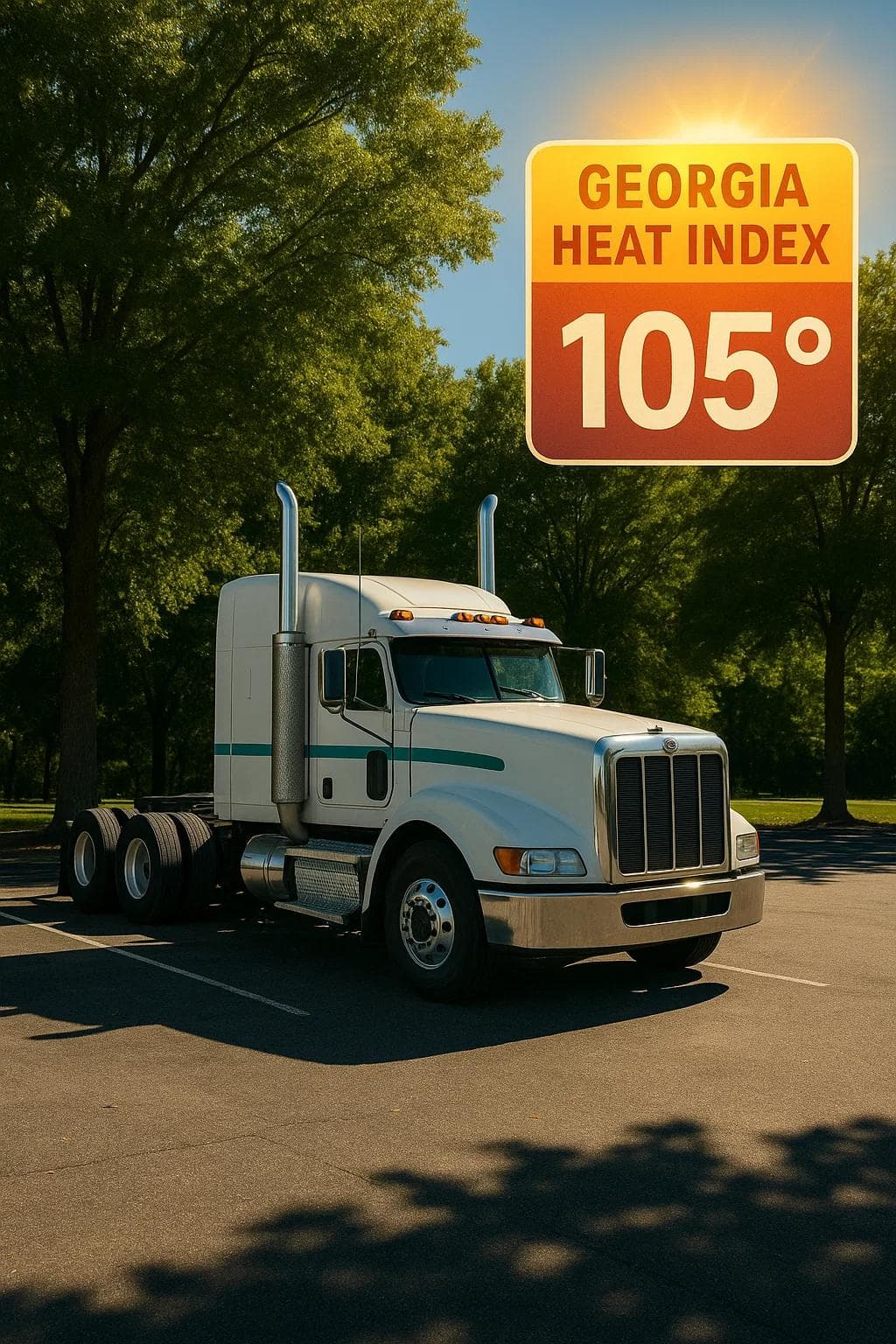Hurricane Season Truck Parking: Emergency Planning for Drivers (2025)
A full hurricane season guide for Georgia truckers. Learn emergency parking strategies, preparation steps, and why Superior Truck Parking is storm-ready at I-75 Exit 312.

Hurricane Season Truck Parking: Emergency Planning for Drivers (2025)
Hurricane season from June through November poses unique challenges for truck drivers operating in Georgia. From coastal regions to the busy I-75 corridor, storms like Hurricanes Michael and Irma have shown how quickly conditions can change. Evacuation routes jam up, safe parking becomes scarce, and drivers are left balancing delivery deadlines with personal safety.
With climate change extending storm seasons and intensifying weather, preparation has never been more critical. Trucks carry essential goods that keep communities running — but drivers need reliable shelter from the storm. That’s why facilities like Superior Truck Parking at I-75 Exit 312 are taking proactive steps to remain safe and operational during severe weather events.
Understanding Hurricane Risks for Truckers
Georgia's Hurricane Exposure
Georgia’s coastal areas are vulnerable to storm surge and heavy rain, while inland routes like I-75 often become evacuation lifelines. High winds, localized flooding, and even tornadoes spawned by hurricanes can affect trucking corridors far from the coast. Historical storm paths show that drivers must consider wind zones, flood-prone regions, and the duration of road closures during major storms.
Trucker-Specific Challenges
- High-profile trucks are unstable in strong crosswinds.
- Securing loads becomes harder with sudden gusts and heavy rain.
- Route closures and restrictions disrupt schedules.
- Fuel shortages occur when evacuees crowd stations.
- Communication networks can fail, leaving drivers disconnected.
- Family safety concerns add emotional strain.
- Equipment damage can halt operations for weeks.
Economic Impact
Downtime costs truckers an average of $1,000 per day. Damaged trailers, spoiled freight, and insurance deductibles add up quickly. Recovery delays affect delivery contracts, while broader market disruptions ripple through the supply chain.
Plan Hurricane Parking NowPre-Season Preparation
Emergency Kit Essentials
- 1 gallon of water per day for 5 days
- Non-perishable food and manual can opener
- First aid supplies and 2-week medication supply
- Charged battery banks and vehicle chargers
- Weather radio, flashlights, and extra batteries
- Emergency blankets, tools, and rope
- Cash reserves for fuel or supplies
- Important documents in waterproof storage
Communication Planning
Stay connected with multiple devices, satellite communication if available, and an updated emergency contact list. Set clear check-in times with family and follow company protocols. CB emergency channels and verified social media groups help truckers share real-time updates.
Documentation Preparation
Store digital copies of your CDL, medical card, insurance, vehicle registration, and load paperwork in cloud storage. Keep printed backups in waterproof sleeves to access during outages.
Download Preparation ChecklistStorm Tracking and Decision Making
Reliable Information Sources
Rely on the National Hurricane Center, Weather.gov, Georgia DOT alerts, trucking apps, and verified CB radio channels. Company dispatch and local news provide critical location-specific updates.
Go/No-Go Decisions
Use a 72-hour planning window to decide whether to stay on the road or secure parking. Factor in route conditions, equipment limitations, load priority, and personal safety thresholds.
Timing Strategies
Reserve safe parking early, fuel before shortages, and beat evacuation traffic where possible. Build flexibility into your schedule for both departure and return.
Safe Parking During Hurricanes
Location Selection Criteria
- High elevation away from flood zones
- At least 100 miles from the coast
- Facilities with reinforced structures and backup power
- Nearby fuel and emergency services
- Reliable communications on site
Facility Preparedness
Look for sites with hurricane protocols, 24/7 staff, generator capacity, and clear damage recovery plans. Security continuity is critical to protect your truck and cargo.
Parking Strategies
- Park away from trees, light poles, and loose debris.
- Orient equipment to minimize wind resistance.
- Leave room for emergency movement and clear exit routes.
- Secure loads tightly and avoid low-lying flood zones.
Superior Truck Parking Hurricane Readiness
Located 65 miles inland at I-75 Exit 312, Superior Truck Parking combines safety, security, and preparation:
- Reinforced infrastructure with wind-resistant fencing
- Drainage systems preventing flood issues
- Backup generators, water reserves, and emergency lighting
- 24/7 staffed protocols and communication assistance
- Extended stay options and insurance coordination
- Proven record: zero flooding and minimal closures during past storms
During the Storm
Safety Protocols
Secure all equipment, conserve power and supplies, minimize movement, and monitor conditions continuously. Follow facility instructions and document everything for insurance purposes.
Communication Management
Keep check-ins brief to conserve battery, verify updates through official sources, and avoid unconfirmed rumors. Maintain a predictable schedule for contacting dispatch and family.
Stress Management
Stay calm with simple routines, light exercise, social contact, and entertainment. Prioritize rest and use professional support resources if anxiety becomes overwhelming.
Post-Storm Recovery
Damage Assessment
- Ensure personal safety first
- Inspect vehicle and cargo thoroughly
- Contact insurance promptly and document damage
- Plan repairs and update routes carefully
Return to Operations
Check fuel availability, customer schedules, and road conditions before rolling out. Update financial and delivery plans to reflect any downtime.
Lessons Learned
Refine your emergency plans after each storm. Adjust supplies, update contact lists, and share experiences with the trucking community to strengthen preparedness for future events.
Frequently Asked Questions
- When should truckers evacuate? At least 72 hours before landfall when routes are clear.
- How far inland is safe? Generally 100+ miles, depending on storm size.
- Can trucks operate in tropical storm winds? Not safely — winds over 39 mph are dangerous.
- What hurricane supplies are essential? Water, food, first aid, chargers, documents, and cash.
- Does Superior Truck Parking stay open? Yes, with 24/7 staff and backup systems.
- How do I secure my truck? Park away from hazards and use load-securement methods.
- What about refrigerated loads? Generators or alternative power sources are critical.
- Are reservations available? Yes — reserve early to guarantee space.
- What if I’m caught on the road? Seek the nearest safe inland facility immediately.
- How soon can I return? Once roads are clear and your equipment is verified safe.
Conclusion
Hurricane preparation is essential for every trucker operating in Georgia. With the right supplies, communication plans, and safe parking options, you can stay protected while keeping America’s freight moving. Superior Truck Parking provides a proven safe haven — inland, secure, and fully prepared for severe weather.
Make safety your priority this season. Reserve Your Storm-Safe Parking Space Today
Ready to Reserve Your Truck Parking Spot?
Don't wait for secure parking. Reserve your spot at Superior Truck Parking today and enjoy peace of mind with our 24/7 secured facility.
Professional Parking Management: Our facility uses the therighut.com platform for seamless booking and management. This industry-leading software ensures smooth operations and the best experience for our customers.
About Superior Truck Parking
Discover updates, route guides, and driver resources from Superior Truck Parking in Calhoun, GA. Learn about secure parking solutions along I-75 designed for safety, convenience, and compliance.
Related Posts

Tornado Safety for Truckers: Emergency Parking Strategies (2025)
A complete tornado safety guide for truckers in Georgia. Learn emergency parking strategies, storm alerts, and how Superior Truck Parking keeps drivers safe.

Summer Heat Survival: Truck Parking in Georgia's Hot Season (2025)
Stay cool and safe during Georgia's 95°F+ summers. Learn expert truck parking, heat safety tips, and Superior Truck Parking advantages to beat the heat.

Winter Truck Parking in North Georgia: Preparation Guide (2025)
Prepare your truck for North Georgia’s harsh winters. Learn parking strategies, ice storm safety, and how Superior Truck Parking keeps drivers secure all season.
